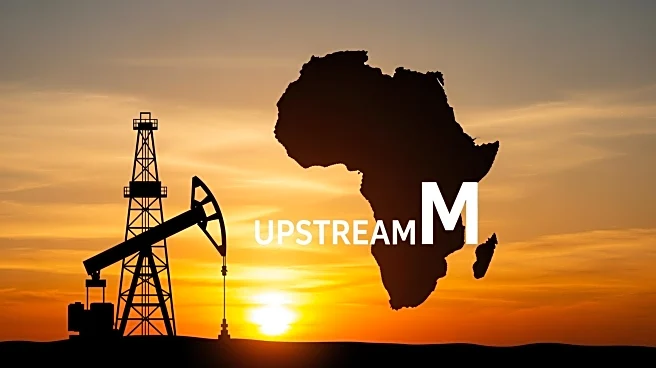What's Happening?
Africa's oil and gas sector is poised for significant growth in mergers and acquisitions (M&A) as the continent enters a new phase of consolidation and exploration. According to the African Energy Chamber's
State of African Energy 2026 Outlook, M&A activity is accelerating due to strategic portfolio realignments by international oil companies, global independents, and emerging African operators. This trend is driven by divestments from legacy assets and new investor-friendly licensing terms, sparking renewed interest in both mature and frontier basins. In the first half of 2025, global upstream M&A totaled approximately $51 billion, with a notable increase in African transactions as operators reposition portfolios and capitalize on divestments by major producers. Key transactions include ExxonMobil's sale of a 30% interest in Mobil Producing Nigeria Unlimited to Seplat Energy and Shell's sale of its onshore subsidiary in Nigeria to Renaissance.
Why It's Important?
The surge in M&A activity in Africa's oil and gas sector is significant for several reasons. It reflects a strategic shift by international oil companies to focus on offshore and deepwater developments while local operators assume control of onshore assets. This realignment could lead to increased efficiency and scale among mid-sized and independent African companies. The renewed investor confidence, driven by streamlined divestment approvals and clarified fiscal terms under Nigeria's Petroleum Industry Act, suggests a more stable and attractive investment environment. Additionally, the opening of new licensing rounds in countries like Algeria and Libya offers fresh exploration opportunities, potentially boosting the continent's resource development and economic growth.
What's Next?
Looking ahead, the African oil and gas sector is expected to experience further consolidation, particularly among mid-sized and independent companies. Stock-for-stock transactions are becoming more common as companies seek to enhance scale and efficiency. The continuation of licensing rounds across the continent, including in Angola, Sierra Leone, Congo, and Tanzania, is likely to fuel further exploration and investment. As global operators streamline portfolios and local independents expand their reach, 2026 is shaping up to be a defining year for Africa's upstream industry, characterized by consolidation, exploration, and renewed investor confidence.
Beyond the Headlines
The ongoing changes in Africa's oil and gas sector could have broader implications for the global energy market. As African countries enhance their resource management and investment frameworks, they may become more competitive players in the global energy landscape. This could lead to shifts in global energy supply dynamics and influence international energy policies. Additionally, the focus on offshore and deepwater projects may drive technological advancements and innovation in the sector, potentially setting new standards for sustainable and efficient resource extraction.










